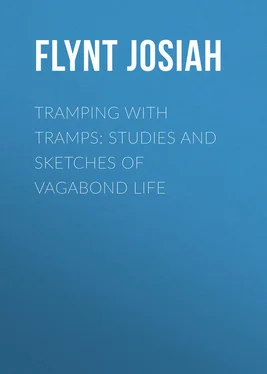Josiah Flynt - Tramping with Tramps - Studies and Sketches of Vagabond Life
Здесь есть возможность читать онлайн «Josiah Flynt - Tramping with Tramps - Studies and Sketches of Vagabond Life» — ознакомительный отрывок электронной книги совершенно бесплатно, а после прочтения отрывка купить полную версию. В некоторых случаях можно слушать аудио, скачать через торрент в формате fb2 и присутствует краткое содержание. Жанр: foreign_antique, foreign_prose, на английском языке. Описание произведения, (предисловие) а так же отзывы посетителей доступны на портале библиотеки ЛибКат.
- Название:Tramping with Tramps: Studies and Sketches of Vagabond Life
- Автор:
- Жанр:
- Год:неизвестен
- ISBN:нет данных
- Рейтинг книги:3 / 5. Голосов: 1
-
Избранное:Добавить в избранное
- Отзывы:
-
Ваша оценка:
- 60
- 1
- 2
- 3
- 4
- 5
Tramping with Tramps: Studies and Sketches of Vagabond Life: краткое содержание, описание и аннотация
Предлагаем к чтению аннотацию, описание, краткое содержание или предисловие (зависит от того, что написал сам автор книги «Tramping with Tramps: Studies and Sketches of Vagabond Life»). Если вы не нашли необходимую информацию о книге — напишите в комментариях, мы постараемся отыскать её.
Tramping with Tramps: Studies and Sketches of Vagabond Life — читать онлайн ознакомительный отрывок
Ниже представлен текст книги, разбитый по страницам. Система сохранения места последней прочитанной страницы, позволяет с удобством читать онлайн бесплатно книгу «Tramping with Tramps: Studies and Sketches of Vagabond Life», без необходимости каждый раз заново искать на чём Вы остановились. Поставьте закладку, и сможете в любой момент перейти на страницу, на которой закончили чтение.
Интервал:
Закладка:
This is his attitude toward the world at large. He puts on a bold front, and, as he himself says, "nerves" the thing through. In the bosom of his hang-out, however, – and this is where we ought to study his ethics, – he is a very different man. His code of morals there will compare favorably with that of any class of society; and there is no class in which fair dealing is more seriously preached, and unfair dealing more severely condemned. The average criminal will stand by a fellow-craftsman through thick and thin; and the only human being he will not tolerate is the one who turns traitor. The remorse of this traitor when brought to bay by his former brethren I have never seen exceeded anywhere. It was my fate some years ago, while living with tramps, to be lodged in a jail where one of the prisoners was a "State's evidence" witness. He had been released from prison by promising to tell tales on an old man, – who was supposed to be the main culprit in the crime in question, – and was lodging in the jail until the trial was over. Unfortunately for him, some of the prisoners had known him prior to this episode in his career; and they sent him to Coventry so completely that his life in the jail became unbearable, and he almost died ere he could give his testimony. At night we could hear him groaning in his sleep as if he were undergoing the most fearful torture, and in the daytime he slunk around the corridors like a whipped dog. He lived to give his evidence in the trial, and was released from durance; but a few days later he was found dead by his own hand. When the inmates of the jail heard of his fate they relented a little in their hatred of him; but the final opinion was that suicide was the best solution of the problem.
It is thought by criminologists that the good fellowship of the criminal is due to self-preservation and the fear that each man will hang separately if all do not hang together. They maintain that his good feeling is not genuine and spontaneous emotion, and that it is immaterial what happens to a "pal" so long as he himself succeeds. This is not my experience in his company. He has never had the slightest intimation that I would return favors that he did me; and in the majority of instances he has had every reason to know that it was not in my power to show him the friendliness he wanted. Yet he has treated me with an altruism that even a Tolstoi might admire. At the hang-out I have been hospitably entertained on all occasions; and I have never met a criminal there who would not have given me money or seen me through a squabble, had I needed his assistance and he was able to give it. This same comradeship is noticeable in all his relations with men who are in the least connected with his life and business; and it is a notorious fact that he will "divvy" his last meal with a pal. To have to refuse the request of one of his fellows, or to do him an unkindness, is as much regretted by the criminal as by any one else; and I have never known him to tell me a lie or to cheat me or to make fun of me behind my back.
There are also some things in his relations with the outside world which, in his heart of hearts, he regrets and repents of as much as he does the misdeeds in his own world. He always feels bad, for instance, when he takes money from the poor. It sometimes happens in his raids that he makes mistakes and gets into the wrong house, or has been deceived about the wealth of his victims; and if he discovers that he has robbed a poor man, or one who cannot conveniently bear the loss, he is ashamed and never enjoys the plunder thus won. He is too near the poor, in both birth and sentiment, not to feel remorse for such an action; and I have known him to send back money after he has discovered that the person from whom he took it needed it more than he.
The taking of life is another deed that he regrets far more than he has been given credit for. One thinks of the criminal as the man who has no respect for life, as one who takes it without any twitchings of conscience; but this is not the general rule. The business criminal never takes a life, if he can help it; and when he does, he expects, in court, to receive the death-penalty. Indeed, he believes, as a rule, that murder deserves capital punishment; and I have often heard him express wonder at the lightness of the penalties which murderers receive.
At the hang-out a favorite topic of discussion is, which penalty is preferable – life-imprisonment or death. The consensus of opinion has generally run in favor of life-imprisonment, even with no hope of pardon; but I have never heard a whimper against the justice of the death-sentence.
It is also true that the majority of criminals regret finding a man in their class who has once belonged to a better one. They are invariably sorry that he has lost caste, no matter what the circumstances have been that have brought him low, and are more likely to help him back to decent society, providing he shows repentance and willingness to do better, than they are to help themselves.
Philanthropists might learn a great deal of charity from the criminal. His idea is that it is better to keep a member of a respectable class of society from falling than it is to raise some one in a lower class to a higher one – a philosophy which I think very sound.
One more regret which nearly all criminals of the class I am considering have experienced at one time or another in their lives, is that circumstances have led them into a criminal career. Their remorse may be only for a moment, and an exaggerated indifference often follows it; but while it lasts it is genuine and sincere. I have never known a criminal well who has not confessed to me something of this sort; and he has often capped it with a further confidence – his sorrow that it was now too late to try anything else.
V
Such, in hurried and transitory outline, is the impression the criminal has made upon me in the open day. The mistakes which criminologists have made in regard to his case seem to me to be these: They have failed to take note of the fearful effects of confinement upon his health; they have allowed themselves to be deceived by him in regard to his intelligence; and they have judged of his moral status simply from his "faked" attitude toward the world at large, failing to take into account his ethics among his fellows. I believe, too, that they are on the wrong track in their studies of the criminal's skull. They have examined it in all manner of ways with an ever-varying result; for each investigator comes to a different conclusion. Far better for criminology to study the criminal's milieu ; and until this is done thoroughly and conscientiously, he cannot be reasonably apprehended and scientifically treated.
So far as our present knowledge of his case can help us, he himself teaches what ought to be done with him. I have written of the discouraged criminal – the man who has given up crime because he has discovered that it was not worth the pains it cost him. Punishment, or expiatory discipline, if you please, has brought him to this conclusion. Here is good penology for us. If a man does wrong, wilfully and knowingly, he must be disciplined till he learns that society will not tolerate such conduct. The discouraged criminal is one who has been thus instructed. Now that he is a tramp, the same principle must be applied to him again: make him a discouraged vagabond. Such is the treatment which society must bring to bear on the deliberate law-breaker.
If I have studied the criminal to any purpose, it is with the resulting conviction that he is physically, mentally, and morally responsible; and that, though unhappy in his birth and environment, the very energy which has enabled him to get away from his poverty is the "promise and potency" of a better life. And human hope looks forward to a day when, in the regeneration of his class, he shall be born into better things than crime.
Читать дальшеИнтервал:
Закладка:
Похожие книги на «Tramping with Tramps: Studies and Sketches of Vagabond Life»
Представляем Вашему вниманию похожие книги на «Tramping with Tramps: Studies and Sketches of Vagabond Life» списком для выбора. Мы отобрали схожую по названию и смыслу литературу в надежде предоставить читателям больше вариантов отыскать новые, интересные, ещё непрочитанные произведения.
Обсуждение, отзывы о книге «Tramping with Tramps: Studies and Sketches of Vagabond Life» и просто собственные мнения читателей. Оставьте ваши комментарии, напишите, что Вы думаете о произведении, его смысле или главных героях. Укажите что конкретно понравилось, а что нет, и почему Вы так считаете.












